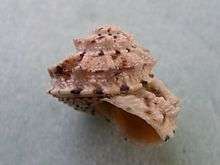Rubritrochus declivis
Rubritrochus declivis, common name : the sloping gibbula, is a species of sea snail, a marine gastropod mollusk in the family Trochidae, the top snails.[1]
| Rubritrochus declivis | |
|---|---|
 | |
| a shell of Rubritrochus declivis | |
| Scientific classification | |
| Kingdom: | Animalia |
| Phylum: | Mollusca |
| Class: | Gastropoda |
| Clade: | Vetigastropoda |
| Order: | Trochida |
| Superfamily: | Trochoidea |
| Family: | Trochidae |
| Genus: | Rubritrochus |
| Species: | R. declivis |
| Binomial name | |
| Rubritrochus declivis (Forsskål in Niebuhr, 1775) | |
| Synonyms[1] | |
| |
Description
The shell grows to a length of 24 mm. The umbilicate, conical shell is solid. It is whitish, and maculated with purplish or yellowish. The six whorls are bicarinate at the periphery, all over spirally lirate. The upper surface is strongly radiately costate. The folds terminate at the periphery in short spines. The periphery is encircled by a channel bearing a median riblet. The base of the shell is convex, bearing 4 or 5 strong concentric lirae. The rounded aperture is smooth within. The columella is sinuous, arcuate, and dentate at the base. The umbilicus is moderate deep.
This species is separated from all others in this genus by the scalariform spires, strongly plicate upper surface, and the deep channel encircling the periphery.[2]
Distribution
This species occurs in the Red Sea and the Gulf of Aqaba
References
- Rubritrochus declivis (Forskål, 1775). Retrieved through: World Register of Marine Species on 29 August 2011.
- Tryon (1889), Manual of Conchology XI, Academy of Natural Sciences, Philadelphia
- Moazzo, P. G. (1939). Mollusques testacés marins du Canal de Suez. Mémoires de l’Institut d’Égypte. 38: 1–283, pl. 1-14 + frontispice, maps 1–4.
- Vine, P. (1986). Red Sea Invertebrates. Immel Publishing, London. 224 pp
- Beck L.A. (1995) Rubritrochus, a new genus name for Gibbula pulcherrima A. Adams 1855 and Gibbula declivis (Forskal 1775). Archiv für Molluskenkunde 124(1–2): 65–85
External links
- "Rubritrochus declivis". Gastropods.com. Retrieved 2 April 2011.